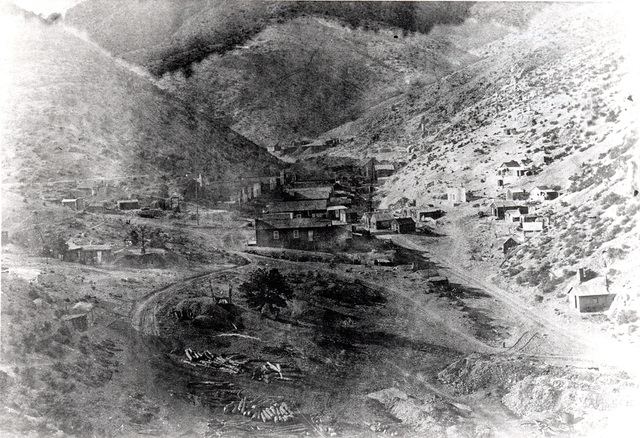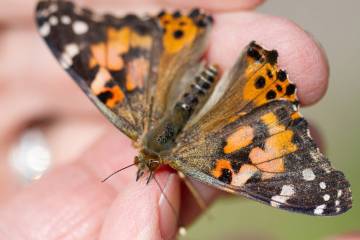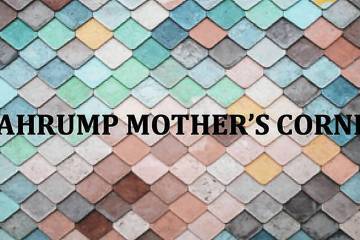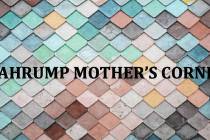Hurdy houses, hurdy girls flourished in boom towns
Editor’s note: This is the first in a series of stories by historian Bob McCracken on the history of prostitution in Nevada and Nye County. A new feature in the series will come out every Friday for the next several weeks.
What is prostitution? Prostitution is sometimes referred to as the world’s oldest profession.
Maybe.
It depends on your definitions.
The idea of an individual having any kind of profession does not go back that far.
Yet the practice of exchanging sex for something of value is very old. Chimpanzees, for example, are known to trade sex for food. Chimps love meat and males have been observed to climb a tree, kill a monkey, and give the carcass to a female to eat; she shows her appreciation by allowing sex.
The term “whore” is quite old and originally referred to a promiscuous woman or adulteress, with no mention of money.
The word “prostitute” did not enter the English language until the 1500s and then as a verb meaning to sell something.
One writer has suggested that while the exchange of sex for something of value may be ancient, our image of a prostitute is in significant measure a “product of nineteenth century Victorian morality and its police force.”
In any case, what we think of as a prostitute seems to be a relatively new take on an old idea.
Early boom towns
Men typically far outnumbered women during the first years of mining boom towns on the American western frontier.
Boom town life could be rough and raw — no place, many believed, for a man’s wife and children.
If a man had a woman in his life (and many did not), few would have been willing to subject her to the rough-hewn lifestyle that characterized the quest for the golden glitter.
Though women were valued and greatly esteemed in the American West, there was a tendency to view them from a Victorian perspective. Women were generally thought to be weak and dainty, clean and demure, with minimal sexual passion, really a kind of property in need of protection in varying degrees by a virile male.
One important exception to this romantic view of women was the prostitute.
Prostitutes were among the first arrivals in a mining boom town.
Men generally saw them as tough and resourceful, passionate and fun-loving people with big hearts who provided an essential human service.
The old saying, “First came the miners, and then the whores,” holds considerable truth.
Like so many frontier mining towns throughout the West, prostitution was established early in the history of Nye County towns, including Belmont, Tybo, Rhyolite, Manhattan, and Round Mountain and, of course, Tonopah and nearby Goldfield in Esmeralda County.
It was common in the West for prostitution to persist in mining towns long after the mines had closed and the towns’ glory faded.
This was certainly the case for Nye County and most of Nevada.
Since about 1930, which marks the end of Nye County’s mining boom town heyday, the majority of residents have agreed that prostitution, when properly managed, makes for a better community, one that is much safer for women and children.
Moreover, often when a woman spent a substantial part of her career as a prostitute in a community, perhaps advancing to manager or brothel owner as she grew older, she attained a kind of female icon status, loved and respected, widely recognized for her humanity and generosity.
Prostitution in Tybo
Tybo was one of the most important early Nye County boom towns.
It was based on the discovery of a large deposit of lead and silver at the south end of the Hot Creek Range in northern Nye County by Dr. James Gally and his partner, M. B. V. Gallett, in August 1870.
For several years, Tybo was what I call the gem of the sagebrush frontier. Though it never had a population of much more than a thousand and was quite isolated geographically, for a number of years its vibrant social life might well be the envy of many modern-day urban dwellers.
It is probably safe to say that any community of any consequence in early Nye County had at least one brothel.
Though prostitution was widely accepted in Tybo by most residents as a legitimate activity in the community, it was seldom mentioned in the press of the time.
While it is not clear when the first brothel was established in the Tybo area, it was likely around 1872.
The following homage to a departing prostitute who had obviously been greatly appreciated in Tybo demonstrates the presence of sex for hire by 1877. (Note: At that time, prostitutes were called “hurdies” and brothels were “hurdy houses.”)
“There is a void in Tybo society, that will be sadly felt by the festive coal-burner and bullwhacker. The coy and bewitching hurdy whose arts and blandishments so often interwove the tendrils of her heart about these stalwart sons of toil in all the fascinations of waltz and schottish, has donned her cleanest linens and departed to new fields of conquest. Verily, the gods smile unpropitious upon the boys” (Tybo Sun, September 15, 1877).
Note also the writing style used in the homage. Known as the “sagebrush style of journalism,” it featured colorful and rich use of language and originated on Nevada’s sagebrush frontier. Mark Twain, America’s greatest author, cut his literary teeth on it when he worked as a reporter in Virginia City.
In May 1878 the Sun carried the following: “Our cup of harmony is nearly full. Now that we have a hurdy-house, all we need is a brass band to practice at the next door and we would be fixed” (Tybo Sun, May 4, 1878).
That same month, a man suffering from what was described as an overdose of benzene got out of hand in a Tybo hurdy house. “To show what kind of a hairpin he was, he began flourishing a pistol, which exploded during the interesting performance,” the Sun wrote. “Unfortunately,” the paper reported, the “ball merely grazed his hand, instead of perforating a vital part.”
A night’s lodging in the jail “was the remedy for his idiotic practice,” said the Sun, an “antidote in every case” (Tybo Sun, May 25, 1878).
In August, the Tybo Sun carried an item in the section of the paper reserved more or less for short local items. A good guess is it applied to Tybo — perhaps Belmont, but we can’t be absolutely sure.
It concerns the closing of a local hurdy house. A correspondent wrote: “‘One by one the roses fall.’ This time it’s the hurdy house that’s passed in its chips. No more doth the hair of the horse torture the bowels of the cat; no more doth the ‘music’ that ‘hath charms’ disturb our slumbers, or ‘soothe the savage breast’ enough to make him put up his ‘little one-half dollar.’ The hurdies have folded their ‘store close’ and stolen silently away, leaving a blank silence on the evening air and a void in the lives of many. She’s gone where the woodbine twineth, the proverbial spout, and the ‘sound of revelry by night’ is hushed. Yes, she’s busted, and alas, we weep at the remembrance of ‘departed’ joys” (Tybo Sun, August 17, 1878).
Four years earlier, the Belmont Courier took note of the different ways in which men and women were judged when it came to prostitution. The editor was curious to know “the difference between a hurdy-gurdy girl and the men who dance with them at hurdy brothels.”
It was noted that a woman who danced in the Crook Shop (a local brothel) was not admitted to a “respectable party” while the man who danced with the “hurdy-gurdy girl” suffered no diminishment in respectability. Why should that be, the item asked: “If there is any difference between Tweedle Dee and Tweedle Dum, we confess our ignorance” (Belmont Courier, June 27, 1874).
Belmont’s hurdy dance house
The presence of brothels in Nye County’s earliest communities was not without critics.
By the spring of 1874, the Nevada State Legislature passed legislation that allowed the state’s town and city governments to ban houses of prostitution.
At the time, J. R. Seymour operated the Cosmopolitan Saloon in Belmont, described as a “hurdy dance house.” The Belmont Courier (March 21, 1874) noted that the law offered a way whereby such places “could be suppressed at once.”
In an article on the matter, the Courier provided a good example of the invective a minority could use to address the practice of prostitution at that time.
The newspaper was at pains to point out that it held no personal animosity against J. R. Seymour. Nevertheless, the editors stated, “We are forced to denounce as a moral wrong the hurdy dance house now in existence.”
The continuance of the Cosmopolitan Saloon, the Courier said, “is calculated to work an injury to the young, as well as the old person, who may frequent its alluring temptations.”
Yes, even senior citizens shouldn’t be trusted in the presence of such temptation.
In further justifying its opposition, the Courier said, “There have already been several disturbances and pistol shots fired by those in attendance, but fortunately, no fatal results.”
“Supposing a fatal shot should be fired,” the paper said, “in all probability it would be a cost to the county of from $3,000 to $10,000 to prosecute the case.”





















